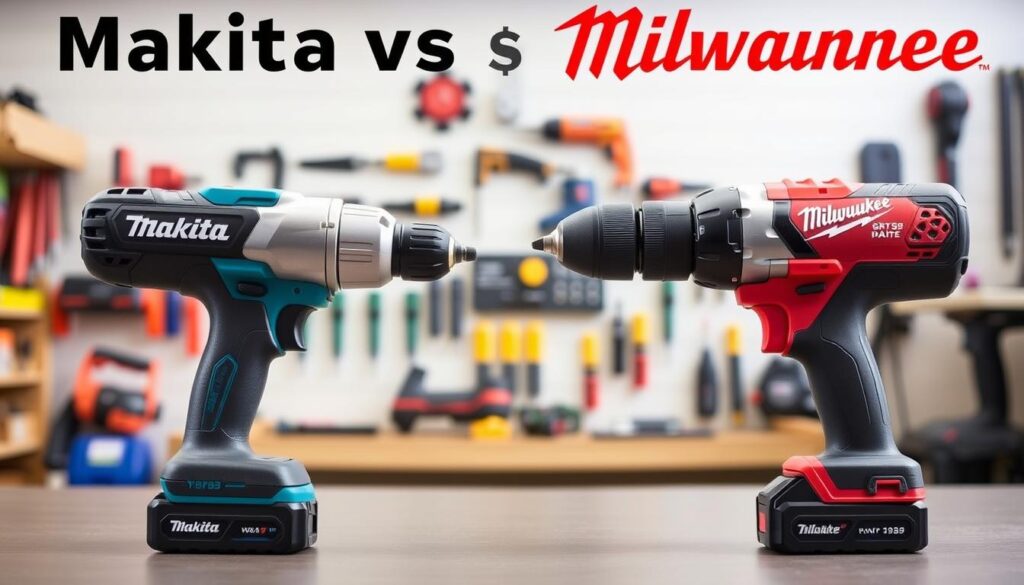Are you torn between choosing the best impact driver for your toolbox?
When it comes to premium professional brands, Makita and Milwaukee stand out for their high-quality products. The Makita GDT01 and Milwaukee 2953 are their flagship models, boasting advanced features and exceptional performance.
This comprehensive guide compares these two leading impact drivers, helping you make an informed decision based on testing and real-world applications.
Key Takeaways
- Comparison of Makita GDT01 and Milwaukee 2953 impact drivers
- Key differences in performance and design
- Features and value for money analysis
- Ergonomics and smart features evaluation
- Guidance for professionals and DIY enthusiasts
Makita vs. Milwaukee: The Professional’s Choice
In the world of professional power tools, the choice between Makita and Milwaukee can be a difficult one. Both brands represent the premium end of the market, with loyal followings and distinctive advantages.
Makita GDT01 vs. Milwaukee 2953: Key Specifications
The Makita GDT01 is the flagship model from their 40V max XGT line, boasting impressive specifications. It has a max torque of 1950 in-lbs and a head length of 4.8 inches. On the other hand, Milwaukee’s 2953 is their 4th generation M18 Fuel impact driver, offering slightly higher torque (2000 in-lbs) and faster top speeds (up to 3900 RPM).
When comparing the bare tool weights, both drivers weigh exactly the same at 2.2 lbs. However, the weight increases to 3.7 lbs for the Makita with battery and 3.9 lbs for the Milwaukee.
What You Need to Know Before Buying
Understanding the specifications is crucial before making your purchase, as they directly impact the tool’s performance in different applications. You should consider your specific work requirements – whether you need maximum speed, torque, or a balance of both – before deciding which brand better suits your needs.
The battery systems differ significantly between the two brands. Makita uses their 40V XGT system with a 2.5Ah battery, providing equivalent power to Milwaukee’s 18V 5.0Ah battery, both offering 90Wh capacity.
Performance Comparison: Speed, Power and Efficiency
In the world of impact drivers, speed, power, and efficiency are crucial factors that determine their effectiveness. To evaluate these aspects, we conducted a series of tests comparing the Makita GDT01 and Milwaukee 2953.
Milwaukee’s Speed Advantage

Our tests revealed that the Milwaukee 2953 outperforms the Makita GDT01 in terms of speed. When driving medium-load 6-inch x1/4-inch GRK Fasteners RSS screws into stacked OSB subfloor, the Milwaukee 2953 completed the task in just 8.6 seconds, compared to the Makita GDT01’s 12.8 seconds.
Torque and Nut-Busting Capabilities
The power test involved driving a 10-inch x1/2-inch lag screw into the same material for 30 seconds. The Milwaukee 2953 demonstrated superior driving power, leaving only 1.7 inches proud compared to the Makita GDT01’s 3.5 inches.
Battery Performance and Runtime
Both impact drivers were tested with equivalent 90Wh battery capacity (Makita’s 40V 2.5Ah versus Milwaukee’s 18V 5.0Ah). The Milwaukee 2953 showed consistent performance advantage across all tests, suggesting its higher RPM ratings translate to real-world benefits.
These performance differences could significantly impact productivity on jobsites where repetitive fastening tasks are common. With its advanced High Output batteries, the Milwaukee 2953’s performance improved even further, making it a preferable choice for professionals.
Design Features and Usability
As you weigh the pros and cons of Makita versus Milwaukee impact drivers, their design and usability features are worth examining closely. Both tools boast advanced brushless motors that enhance efficiency, prolong runtime, and extend tool life.
Size, Weight and Ergonomics
The physical design of both impact drivers is noteworthy. Milwaukee’s 2953 has a slightly more compact head length of 4.5 inches compared to Makita’s GDT01 at 4.8 inches, making it marginally better suited for tight spaces. Both tools feature excellent ergonomics, with balanced weight distribution and comfortable grip designs that reduce fatigue during extended use.
Smart Modes and Control Options
The Makita GDT01 offers more control options with four standard modes plus three smart modes (two for tightening and one assist) and three forward and three reverse auto-stop modes. In contrast, Milwaukee’s 2953 offers three standard modes and one assist mode, with the option to upgrade to the 2957 model for customizable controls via One-Key technology.
LED Lighting and Visibility
Both impact drivers feature LED lighting systems around the collet to illuminate the work area. Milwaukee’s three-LED arrangement provides slightly better shadow-free illumination than Makita’s LED halo. Additionally, Milwaukee’s one-hand bit insertion feature adds convenience for quick bit changes.
Price, Value and Warranty Comparison
As you weigh your options between Makita and Milwaukee impact drivers, price becomes a significant consideration. The cost of these premium tools varies substantially between the two brands.
Bare Tool and Kit Pricing
Milwaukee offers a more budget-friendly entry point with their bare tool priced at £149 compared to Makita’s £224. The standard battery kit price difference is even more substantial, with Milwaukee’s kit at £299 versus Makita’s kit at £449.
Combo Kit Options
Both brands offer attractive 2-tool combo kits. Milwaukee’s standard combo is priced at £399, while Makita’s is at £469. Milwaukee’s premium One-Key model (2957) offers advanced features at £199 for the bare tool or £449 for the combo kit.
Warranty Coverage
Milwaukee provides a 5-year warranty on all their tools, compared to Makita’s 3-year coverage. This represents a 67% longer protection period. For professionals, this extended warranty could mean substantial savings over time if repairs become necessary. For more details on the impact drivers, visit our comparison review.
Conclusion: Which Impact Driver Is Right for You?
Our comprehensive comparison of the Makita GDT01 and Milwaukee M18 Fuel impact drivers reveals distinct advantages for different users. The Milwaukee M18 Fuel consistently outperformed the Makita in speed and power tests, making it ideal for professionals prioritising maximum performance.
In contrast, Makita’s GDT01 offers more control options with its additional smart modes and auto-stop features, potentially making it more versatile for precision work. Consider your specific work requirements and existing tool collection when making your decision.
For most users, the Milwaukee M18 Fuel impact driver emerges as the recommended choice based on its balance of performance, features, price, and warranty coverage. Ultimately, both are professional-grade tools that will serve you well for years.



